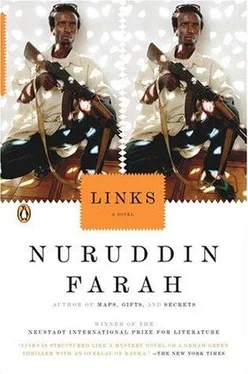Shanta arrived and walked past Seamus into the cubicle, bringing with her a lot more unease than had been there earlier. The silences grew as long as evening shadows, and a hush unlike any other fell on the room. Raasta, desiring to calm the tension, moved to hug her mother.
“Uncle hasn’t been well!” Shanta’s words were reduced to a whine.
Raasta regarded Bile, who now looked fine to her, and thought to herself: But what on earth is Mother talking about?
She gave her mother a sweeter hug, which took in her sorrows, as one might draw up a skirt that’s too long. She talked to her mother, then to Makka, then to the sick girl, in an inclusive way. She beckoned everyone to join in a hug. But when she looked up to invite Uncle Bile and Uncle Seamus, they were not to be found, and she had no idea when or where they had gone. Restlessly, she pulled the sick child closer, as though going down a slide together, down and down until their hearts were in their mouths. Raasta was a little scared going down slides. Shanta rarely gave such all-inclusive hugs to anyone voluntarily.
Raasta now thought of a neater way of closing the brackets her mother had opened when she spoke of Uncle’s not having been well. “Uncle Bile looked fine to me,” she said. “Tell me, what do you think is the matter with him?”
“It’s a long story, my sweet!” said Shanta.
Raasta knew that she wouldn’t get to hear the story. But never mind, she thought, because on the whole she had had a wonderful life, compared with other children; she had had fun, and had been looked after by wonderful people, whom she adored. She knew it would be greedy of her to ask for more. After all, there was no joy in making demands that were impossible to meet. It wouldn’t do to ask Uncle Jeebleh to stay on in Mogadiscio, when he had a family in New York, and a job to go back to. She had met him face to face only yesterday, but she loved him dearly, because of his courage.
Raasta sensed that she had an attentive audience in her mother, Makka, and the sick girl, all three of them eagerly waiting. But since her return, she had been struggling to find her tongue. It was curious that words were avoiding her lately, as though she had betrayed or abused them; they no longer leapt joyously to her tongue as before, when she could speak effortlessly and make them do as she pleased. She looked around self-consciously and saw Shanta studying her with more care — perhaps wondering if the past ordeal had imposed silence on her.
It took a long time, a lot of patience, and a great many questions before mother and daughter passed words back and forth, and in the end resolved what Raasta meant to say. “I’ll never sit on his lap, ever, or hug him or kiss him.” And yes: she knew about the terrible things he had done to Uncle Bile and Uncle Jeebleh decades before, knew about the blood on his hands. There was so much blood he would not be able to wash it away, even if he prayed fifty times a day for the rest of his life.
But there was a hitch. Raasta could not bring herself to use the word “hate” to describe what she felt. The word would not come off her tongue, it just would not, even though for the first time in her young life she felt she hated someone — Caloosha, whom she would never call Uncle again, because he had been very wicked. She believed he was holding her daddy prisoner. And she was certain that he had ordered her abduction and that the job had been carried out by some of his friends. Although she had not seen his face, she suspected that she had heard his voice.
“You’re too young to hate!” Shanta told her.
“I know from what Uncle Bile has said”—Raasta spoke with unprecedented ease, not because she grew more articulate, but because she was quoting her favorite uncle—“that there are too many people fighting over matters of no great consequence.”
For a few moments, the words she ascribed to her uncle gave her as much joy as a new toy might offer another child. Her face beamed as she spoke in a tongue borrowed from her uncle, of how every time militiamen fight and kill, a new twist is given to the old fighting, which then takes on the shape of a new quarrel. And when there is the possibility of peace, a new fight erupts, based on an old complaint, and which some people call justice and others madness. “And,” she asked Shanta, “do you know what Uncle Bile said about civil war?”
“Tell me.”
“That in a civil war there is continuous fighting, based on grievances that are forever changing.”
JEEBLEH’S EYES, WHEN HE SAW THEM IN THE MIRROR WHILE SHAVING THE next day, were proof enough that Caloosha’s death did affect everyone in the close-knit family of choice in major ways, whether they admitted it or not. But how had the death of the monster been achieved? Dajaal? Had Kaahin and his associates, or Qasiir and his boys, lent a hand?
He was surprised to read in a report in one of the Mogadiscio rags, by its correspondent in the north of the city, that Caloosha had died in coitus, croaking on top of his young wife. Other tabloids had a field day too, one topping another in their scoops. A paper based in the south of the city, deemed to be more sober in its analysis and less vitriolic in its assessments, identified the wife as a young woman whom Caloosha had abducted a few years earlier, after killing her entire family. According to this article, he had kept her as his sex slave under lock and key in an upstairs apartment. She belonged to the Xamari community, and was her captor’s junior by at least forty years. Another paper, claiming a valuable inside source, reported that an unidentified woman had summoned Bile to the villa to help resuscitate his brother. He had gone there immediately, together with two other doctors. But their attempt at resuscitation was too late, and he was declared dead at the villa at about five in the morning. Yet another rag emblazoned its front page with the sensational headline “Blame It on Viagra!” Perhaps the editor was simply indulging in some cheap underhand joke at the expense of the dead man.
Jeebleh was surprised that no one expressed the least bit of sorrow at the death of a man whom they knew, and with whom a number of them had had dealings. At worst, he had expected some of those who’d benefited from their association with Caloosha to speak well of him. He wondered whether there would be any mourners at his funeral, or would he be buried alone, no one to attend but the gravediggers?
ON HEARING THAT CALOOSHA HAD DIED, SHANTA REACTED WITH UNBECOMING rage. She described him as a spoilsport.
Cursing, filled with the sappiness of her fury, she let the lava of her anger spill over, but made sure that it didn’t assume the solid form of hard evidence. When she began to cool, she complained: “What peeves me is that he isn’t letting me and Raasta enjoy our reunion in undisturbed peace.”
There was no evidence that Caloosha had committed suicide or that he had willed his own death, as far as Jeebleh could tell.
She raged on regardless. “He won’t grant us the pleasure of enjoying Raasta’s return, nor have we any idea what or who is keeping Faahiye from joining us. It’s Caloosha’s accursed intention to make us all look bad in everybody’s eyes.”
“And how does he do that?”
“I’m saying that even in his death, he is a snob,” she went on. “Look at it this way: The fellow is now spoiling the alla-bari party for your mother tomorrow afternoon. What will people say if we throw a party a day after his internment? And have we decided if we’re going to his burial, as tradition demands?”
“Are you?” asked Jeebleh.
“Are we?”
Silence took both of them by the throat. To complicate matters further, some unasked questions lay between them, on the low table in Bile’s living room: not-yet-composed questions now for Shanta, now for Jeebleh, like flies on the unwashed faces of malnourished children taking breathers after lavish compensatory feedings. One unasked question had to do with what Bile was up to, in the darkened room, with the door closed.
Читать дальше












